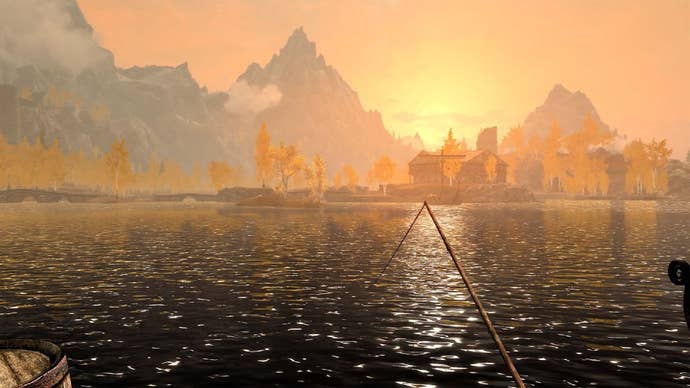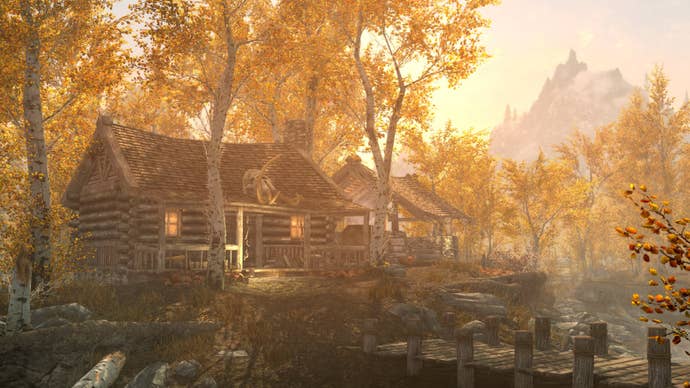Products You May Like
“Modding starts as a hobby and mods are passion projects for most people when they get started,” modder Emmi Junkkari, whom you may know by the handle Elianora, tells me.
“I doubt most people started making content for these games thinking they’ll make mad bucks with Patreon. When Oblivion and Morrowind modding started (and earlier Fallouts), we didn’t have PayPals or Patreons and Ko-Fi wasn’t a thing. I believe people got used to everything being free, and people made content because they wanted to make it, and when new ways for content creators to get compensated for their work have popped up, the Bethesda modding hivemind didn’t quite catch up.”
If you were on social media last week there’s a good chance you saw plenty of examples of the sentiment Junkkari references, likely in posts containing the phrase that, for better or worse, has come to define the controversial topic it’s part of. Paid mods. Unsurprisingly, with the launch of Creations for Skyrim by Bethesda Game Studios on December 5, the debate that’s been raging on-and-off in the communities around the company’s RPGs for years now came to the fore once again.
As modder Shekhinaga wrote in a post on r/skyrimmods about the update that brought this new/revamped initiative to the game: “Bethesda, or Microsoft, or both, I don’t know, are trying their hands at paid mods once more.” Much like we saw with 2017’s introduction of the Creation Club concept and 2015’s original attempt to try out the whole ‘paying for mods’ concept through Skyrim’s Steam Workshop, a lot of the loudest responses from around the community seemed to skew negatively.
Some of these came from modders themselves, declaring that they’d never charge money for their works. Shekhinaga alludes to this “culture of ‘forever free’ users who have different arguments for disliking paid mods” in the collective of reasons why they think the update that brought Creations to the game went down so unfavourably with a lot of the community.
They also outline the headaches caused by the changes Bethesda made as part of this equation, saying: “Modders often have to deal with a lot of issues, ranging from broken systems to updates that break mods that other mods rely on. An update that breaks important frameworks, such as Dynamic Animation Replacer or Open Animation Replacer that introduces a new way to monetise mods will usually be ill-received.”
Elianora, whose player home ‘Shadetree Lodge’ is one of the creations available through the revised platform at launch, thinks a fear that players with hefty established mod preferences will, either now or in the future, end up having to pay by default just to have a “good load order” is also a contributing factor, adding: “I foresee most custom content for these games to remain free.”
While concerns and philosophical differences like these remain, both modders acknowledge that Bethesda has made an effort with Creations to address some of the issues raised with its previous attempts at doing something similar.
“My main gripe with the earliest implementation of paid custom content for these games years ago was that it was a wild west of modding,” Junkkari says, “Nothing was curated, people could upload old mods and new – and even other people’s works.”
“For Creations, Bethesda approves all the works and their creators and QA [tests creations], also you cannot upload old content,” she explains. The modder also adds that she’s a big fan of the fact the usage of generative AI in creations is prohibited, as well as the “new assets” and improvements to the game’s Creation Kit that’ve been made available to all modders as part of the update.
Shekhinaga, on the other hand, argues that Creations “does a lot to address many concerns people had with the previous implementation, but not enough to address the core issue – many of us are extremely averse to paid mods.”
As someone that hasn’t applied to be a part of the Verified Creator Program modders are required to be a part of in order to set prices for their works on the platform, Shekhinaga says: “I am genuinely very happy that modding is being made more accessible and that more people are getting into it. I make mods because I had an idea and wanted to share, so having more people to share [these with] is a good thing.”
However, they have a number of personal reservations about the “tiered, paid-or-unpaid system” it involves, which centre around “quality, expectations, and personal incentives”.

First of all, they explain: “I think that making a paid Creation/mod will lead to a product of lesser quality. If I was going to make a creation, I wouldn’t make something that would be technically challenging to make. I would remain as safe as possible, so as to keep any potential customers happy. I also would broaden the appeal of my mod to increase the number of downloads, and that would lead to some personal spark loss.”
Second, they cite the effect they believe the system could have on how players regard paid and unpaid mods, saying: “When browsing a gallery of anything, many people tend to associate quality with price, and free items are often seen as inferior to paid options. Such an environment would stifle modders who do not charge for their Creations, strictly because of the fact that there isn’t a price tag on them.”
The modder identifies their last big concern as relating to whether the system could be open to issues caused by the different “personal incentives” creators have. “Because of the way the platform is monetized, it is possible to create several small pieces of content and sell them individually,” they explain, adding: “Another concern I have is content that is heavily based on existing mods. The idea of building off a free mod made by an unrelated third party to make a paid product feels off to me.”
They also add that, from a consumer perspective, the inability to personally test Creations with your game before buying them is “a very bad point for more complex load orders, or simply put, games with mods installed.”
On the other hand, Junkkari, who also contributed a number of works to the Creation Club incarnation that debuted in 2017, says that she decided to become a Verified Creator because: “Being able to work on things I love, with some of the most phenomenal devs in the industry and getting paid to do it is just too good an opportunity to pass up.”
“With Creation Club originally, and now Creations, I get to continue freelancing, so I have my freedom to work on my own ideas and inspirations – as opposed to ‘working on someone else’s project’ as a regular game dev – and also being able to work at my own pace. If this program is successful, I could quit my mundane every day job and earn a living doing what I love, working on Skyrim, and hopefully Fallout 4 and Starfield in the future.”

In creating Shadetree Lodge, Elianora reveals that she faced the challenge of achieving the vision she had in mind for the first hunter’s lodge home she’d made since creating Nyyrikki for OG Skyrim while only using vanilla assets. Since she wanted the cosy cottage to work the same across all platforms, including PlayStation – where uploading “new assets like scripts and textures or meshes” for mods remains impossible – the modder had to get creative with some models. For instance, by turning parts of them invisible or swapping in different textures to make new objects.
In terms of the impact she hopes this version of the initiative will have, Junkkari says: “Creations can be a massive opportunity for a lot of the community’s best creators to get to earning a stable keep instead of the occasional donation from a grateful fan, and to get their foot through the door towards Bethesda and the game industry.” She adds: “At least five people who were part of the Creation Club originally are now official Bethesda employees or contractors.”
Meanwhile, Shekhinaga says that they don’t think there is such a thing as a Creations-style system that would make them feel comfortable monetising their mods. “While steps are being taken, I have some serious [concerns] with the idea of creating what is essentially a freelance market for amateur developers. This can have negative implications for both the mod maker and the end user – and potentially Bethesda/Microsoft themselves.”
“It can also be a good thing, if heavily regulated,” they add, “but I think that Bethesda hiring a team of modders to make official content would be better than a marketplace.”
We’ll have to see how the future plays out for Creations to see whether it ends up having any of the positive or negative effects on Bethesda game modding that those on board with it and sceptical of it have suggested. Regardless of whether it turns out to be a positive development, a misstep, or something in between, odds are the community will continue to put out plenty of great passion projects in the interim.
.jpg?width=690&quality=70&format=jpg&auto=webp)